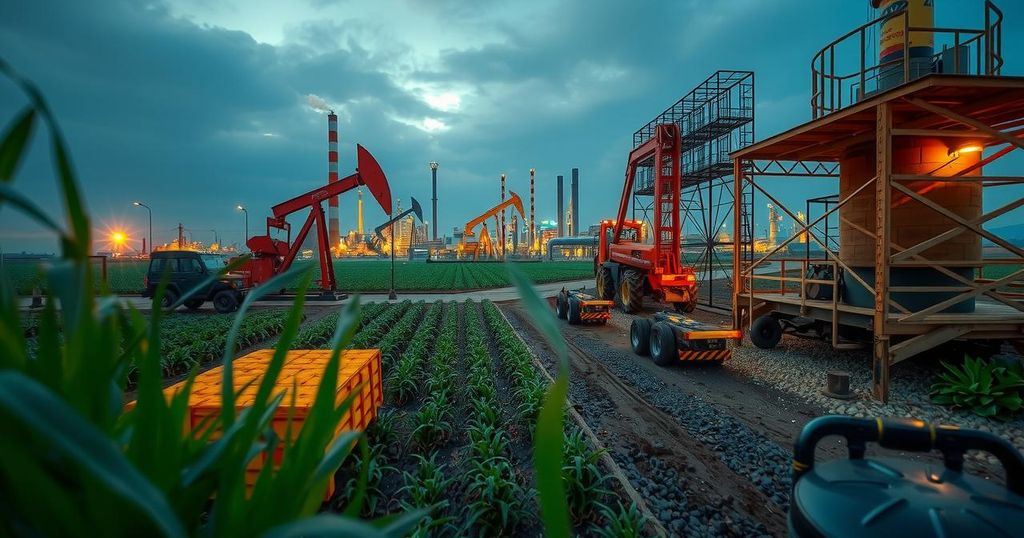Benin’s economy is heavily reliant on external support and has undergone various transformations since independence, with failed socialist policies leading to economic stagnation. Agriculture employs a large part of the workforce, focusing on self-sufficiency in food and cash crops. The industrial sector includes essential manufacturing, while the deepwater port at Cotonou shows potential for enhanced trade. Despite challenges, recent initiatives in oil exploration and privatization indicate a shift toward economic diversification.
Benin’s economy has historically depended on external financial assistance, primarily from France and international organizations, which has mitigated severe economic stagnation and a low living standard for the vast majority of its populace. Following a coup in 1972, the subsequent regime aimed to restructure the economy along socialist lines, nationalizing many sectors and establishing ties with socialist countries. However, by the early 1980s, despite efforts at restructuring, corruption remained prevalent, and economic improvements were negligible. A shift towards economic liberalization in the mid-1980s also failed to yield significant results, leading to the privatization of various sectors in the early 1990s.
Benin’s natural resources include tropical hardwoods in the remaining forests and rich aquatic life in its rivers and lagoons. Significant mineral deposits, including iron ore and limestone, are located in various regions, and the discovery of offshore oil in the late 1960s marked a pivotal development in the energy sector. Agriculture employs about 70 percent of the workforce, with the country achieving self-sufficiency in staple foods while seeing cotton emerge as a leading cash crop, alongside others such as cacao and coffee. Coastal and inland fishing have seen growth with substantial annual catches, notably exporting fish to neighboring countries.
The industrial sector includes the production of processed palm oil, cement, cotton, textiles, and beverages, supported by a thermal electricity generation network supplemented by imports from Ghana. Economic privatization in the late 20th century gave rise to private banking institutions and an increase in foreign aid primarily for development projects. The economy relies on exports of agricultural products, particularly cotton and palm oil, while benefiting from informal trade routes with Nigeria. Benin’s deepwater port at Cotonou presents untapped potential for customs revenue.
Transportation infrastructure comprises two main paved road networks and an active railroad linking Cotonou to Parakou. Navigable rivers and lagoons facilitate local transport, while the main international airport connects Benin with wider regional and international destinations. Overall, the economic landscape of Benin continues to evolve as it attempts to capitalize on its natural resources, stabilize its agricultural sector, and enhance its trade capabilities, despite facing numerous challenges.
The economy of Benin has experienced considerable fluctuations since its independence, often swayed by external influences and internal policy shifts. After gaining independence, the nation relied heavily on foreign aid. Initial economic policies adopted socialist principles, leading to nationalization and an alliance with other socialist countries, which proved inefficient. A series of reforms, including economic liberalization in the mid-1980s and later privatization, aimed to improve productivity and economic standing, but persistent issues such as corruption and dependence on agricultural exports have shaped its current economic framework. The landscape of Benin’s economy includes significant agricultural contributions, a focus on fishing, and recent developments in oil exploitation.
In conclusion, the economic structure of Benin reflects a complex interplay of historical reliance on foreign assistance, attempts at socialist restructuring, and ongoing efforts at liberalization and privatization. Agriculture remains the backbone of the economy, with significant contributions from cash crops and fishing. While the country has made strides in diversifying its economic base and exploring its natural resource potential through oil and minerals, challenges such as corruption and infrastructure limitations continue to impede progress. The deepwater port of Cotonou and enhanced trade relations present opportunities for growth, but require strategic development to fully utilize.
Original Source: www.britannica.com






